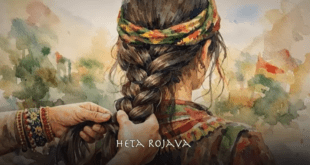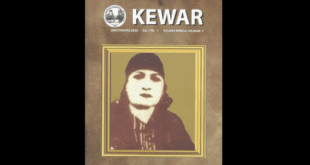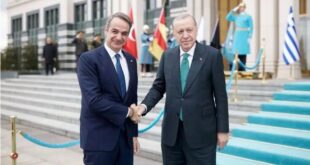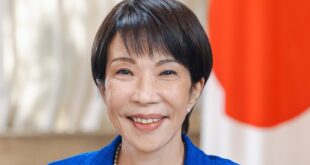Interview: Necat Ayaz
The geographical and eminently geostrategic configuration of the Afar people, who occupy up to 1,000 km of the Red Sea coast (from Massawa in Eritrea to Arta in Djibouti), singularly complicates the struggle for their democratic rights and emancipation. However, it is extremely important to emphasize that the well-known Afar organizations fight first and foremost for their national rights in the state where they live.
Eastern Africa has been a site of continuous conflict between peoples and states, with borders often dividing the same ethnic groups. The Afar people are one example, especially facing oppression in Djibouti. Despite representing half of the population and occupying three quarters of the territory, they have been effectively marginalized by the Djiboutian state, which has been controlled by a single clan since its independence. We spoke to Mohammed Kadamy who is the president of FRUD (Front for the Restoration of Unity and Democracy). The struggle of the Afar people for democracy and justice is the main theme of this conversation.
Your organization has been firmly rooted in Djibouti’s political reality for decades, even though your struggle is little-known to the rest of the world. What are the main demands behind this long struggle?
Since independence in 1977, the Djiboutian state has been a tribal dictatorship. Hassan Gouled, the first President, seized power and plunged the country into a deep political crisis. The Afar community was sidelined and excluded from all spheres of government, while members of the presidential clan monopolized all the important posts. The Arab and Gadaboursi minorities and political activists subsequently suffered repression and discrimination.
Ismail Omar Guelleh, who had been head of security, succeeded his uncle Gouled in 1999. In 2010, he amended the constitution, paving the way for a lifetime presidency. He has already served five terms and is preparing to run for a 6th term in 2026. Djibouti is therefore off to a bad start, to use the expression of René Dumont, (author of the famous book published in 1962, l’Afrique noire est mal partie ).
Djibouti, a tiny state of 23,00 km2, is a place where Afar and Somalis cohabit, two entities that have been at war in Ethiopia for the past 4 years, and a minority of Yemeni origin. Djibouti’s position at the crossroads of Arabia and Africa, on the shores of the Red Sea, makes it a lock on this maritime line that is so important to international economic life. It has real strategic and geopolitical value, which explains why it hosts three Western military bases – French, American and Japanese – as well as a Chinese base. The Red Sea crisis has only reinforced the strategic importance of this microstate. However, behind Djibouti’s geostrategic importance, the population suffers from a relentless dictatorship that generates poverty, repression and marginalization which brings us to your question about the demands of our organization The Front pour la Restauration de l’Unité et la Démocratie-FRUD-created in 1991, is a historical continuum of the democratic movements that fought for independence and democracy in Djibouti.
The fruit of multi-faceted popular struggles for freedoms, democracy and social progress, FRUD rose up against injustice and human rights violations with a radical desire for change. Through the sacrifices of its fighters, it enabled the first steps towards democracy, with the adoption of the Constitution in 1992, 15 years after independence. From the outset, it has been part of a movement for the emancipation of peoples, and a scrupulous defender of human rights.

FRUD split after Ali Mohamed Daoud signed a peace agreement with the government in 1994. The rest of the organization, of which you are a member, fiercely opposed this compromise and continued the armed struggle. Why do you reject this agreement with the government?
The 1994 agreement, signed with a dissident part of the FRUD, followed by a 2nd agreement in 2001, with another faction of the FRUD, did not lead to the establishment of peace or the promotion of democracy… The regime continues to aggravate the causes of the war. This dissidence can be explained by the widespread factionalism in French-speaking Africa, a legacy of French influence. FRUD is the synthesis of two cultures: the armed resistance practiced in East Africa, and the sovereign national conferences that were the basis of democratization in West Africa. Added to this is the clannish fundamentalism of Djibouti’s government, which has nothing to envy to religious fundamentalism and is resistant to any political opening. On 3 occasions (in 1999, 2003 and 2013), the government has refused to accept the verdicts of the ballot box, when opposition coalitions won the elections.
In the face of the refusal to accept change through the ballot box, the continuation of the armed resistance led by the FRUD is not only necessary and legitimate, but indispensable and the only way to put these war criminals out of action. For the criminal nature of the Djibouti regime no longer needs to be demonstrated. Since independence, Djibouti has been characterized by mass repression of political activists and civilians for belonging to certain communities. Arbitrary arrests, torture, extra-judicial executions, rape of Afar women by the army, and massacres of civilians by the state have been denounced throughout these 47 years by human rights organizations. All these crimes have not been punished and remain unpunished.
Since August 1977, one man has been behind all acts of state terrorism against the country’s civilians: Ismael Omar Guelleh, first as head of security, then as head of state. Ismael is guilty of war crimes, mass crimes and crimes against humanity.
Given Djibouti’s small size and geopolitical importance, which entails ongoing cooperation with the Djiboutian regime on the part of France and other world powers, do you think there is a future for guerrilla warfare?
Armed resistance has imposed itself on Djibouti’s democrats as the only way to confront a clannish dictatorship that carries violence like the cloud carries the storm, to use Jean Jaurès’s expression about capitalism.
Indeed, the presence of military bases belonging to large and medium-sized powers, which only consider Djibouti as a strategic site, makes armed resistance extremely difficult, which goes a long way towards explaining the longevity of our struggle and the difficulties we have encountered in making our demands a reality.
In February 1992, the French army intervened and halted the advance of FRUD fighters 52 km from the capital, preventing the rout of the Djiboutian army and saving the regime. But for us, Djibouti is not Terra Nullius, not a pebble as the French military like to say, but a land inhabited by a flesh-and-blood population, proud and resilient. Despite repression and the presence of several foreign military bases, political protest and resistance courageously continue in the face of the brutality and even barbarism of the clan dictatorship
Can the Afar, who are spread across three territories: Djibouti, Ethiopia and Eritrea, fight for their rights independently without intervention from the regional states?

The geographical and eminently geostrategic configuration of the Afar people, who occupy up to 1,000 km of the Red Sea coast (from Massawa in Eritrea to Arta in Djibouti), singularly complicates the struggle for their democratic rights and emancipation. However, it is extremely important to emphasize that the well-known Afar organizations fight first and foremost for their national rights in the state where they live. None of these organizations has as its demand the unification of the Afar people. As far as FRUD is concerned, our objectives are the establishment of a genuine national state, respectful of community and democratic rights in Djibouti.
Parties and groups advocating independence, recognition of ethnic and national rights, and social justice in Africa have become new oppressors when they have come to power. Eritrea and Ethiopia are perfect examples of this trend. Are you aware of this looming danger?
The question is how the armed organizations behaved during their long liberation struggles. If their practices were already anti-democratic and violent with their people in the bush, there’s no reason why they should change when they come to power. The situation in the Horn of Africa is extremely worrying, as internal and inter-state wars have been going on for over 4 decades. Ethiopia and Eritrea are on the verge of unleashing a new conflict that could have a devastating impact on a population already bled dry by previous wars. The conquest of democratic rights through armed struggle, which has been the prerogative of organizations in East African countries, has not yielded the expected results in terms of freedoms, democracy, development and social progress. At FRUD level, we are trying to guard against this kind of danger, by combining armed resistance with sovereign national conferences, and by adopting the Charter for Democratic Transition -CTD- in March 2021 to bring together all Djibouti’s democratic forces.
Reports indicate that the Djiboutian air force has added Turkish-made Bayraktar TB-2 armed drones to its arsenal since 2022. What’s more, the Djiboutian army is training in Turkey in the use of these drones. Are you concerned by this military cooperation between Djibouti’s leaders and the Turkish state?
We are particularly concerned by the military cooperation between Djibouti and Turkey, which has sold 2 Bayraktar TB-2 armed drones worth $10 million and has trained the Djiboutian military in the use of the drones. The Djiboutian army used these drones against Afar civilians in Syarou who were gathered for a funeral on January 30, 2025, killing 14 people, including women and children, and wounding several others, according to the Djiboutian League for Human Rights (LDDH). Among the victims was female resistance fighter Aisha Badoul, who had denounced the rape of Afar women by the army in the north and south-west of the country.
FRUD issued a protest note to Turkey on February 12, 2025, stating that “the Turkish government, which continues to equip, train and assist the Djiboutian military in their operations to massacre civilians, bears a shared responsibility for these killings”. The FRUD called on France, Turkey and other foreign forces stationed in Djibouti not to turn a blind eye to the crimes committed against innocent civilians, and to cease any cooperation that might jeopardize the safety of the civilian population.

As a prominent leader of the Afar people living within Djibouti’s borders, you have experienced armed conflict, reconciliation negotiations and polarization within the Afar movement over the terms of a compromise with the State. Drawing on the lessons of these experiences, do you have any advice or warnings for the Kurdish movement contemplating disarmament and dissolution to integrate the Turkish state without a peace agreement?
A number of Kurdish actors and some observers fear that this unilateral gesture by the PKK leader to disarm his troops without a peace agreement signed with the Turkish side will create further difficulties and will not produce the desired results for the Kurdish people. These various issues will be discussed and possibly clarified within the framework of the PKK Congress planned for this purpose.If this process is brought to a successful conclusion, i.e. peace and the establishment of a genuine democracy, respectful of individual and community freedoms, it will have a major and positive impact on all war-torn regions, including the Horn of Africa. But the success of this unprecedented process depends largely on the Turkish regime, which until now has not been known for its political openness. That’s where the problem lies, but the Kurdish people, with their long experience of struggle, will undoubtedly approach this new phase with great vigilance and, above all, in unity.
——————————————————
 Infowelat Enformasyon Ji Bo Welat
Infowelat Enformasyon Ji Bo Welat




